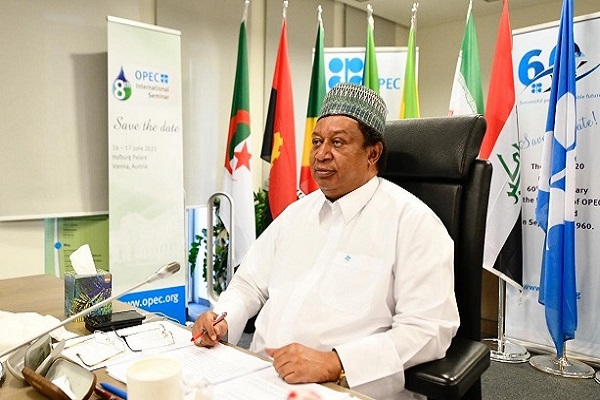Business
OPEC: Gas crises may worsen

The Organisation of Petroleum Exporting Countries (OPEC) Secretary-General, Mohammad Sanusi Barkindo, yesterday warned that the tight supply of gas could worsen owing to limited investment in the industry.
He emphasised that “the tightness we are seeing in the gas market could become more pronounced in the future, given the current efforts aimed at crowding out investment”.
According to him, “there is no short-cut to a lower-carbon future, and you cannot short-sell vital energy assets if you are to achieve a smooth transition.
“Today, it is of utmost importance that Organisations like OPEC and Gas Exporting Countries Forum (GECF) continue to work hand-in-hand to ensure that we remain in a strong position to provide secure, stable and sustainable supplies of energy.”
He spoke virtually at the second High-Level Meeting of the OPEC-GECF Energy Dialogue in Vienna.
Barkindo hoped that Glasgow conference will deliver a comprehensive, all-inclusive agreement focused on achieving the objectives of the Paris Agreement.
He noted that the interests of the 759 million people living without access to reliable electricity, and 2.6 billion people who must rely on unsafe and unhealthy fuels to cook their meals and heat their homes, cannot be overlooked in Glasgow.
Oil and gas, he insisted, could play a central role in the transition.
Earlier, the OPEC scribe bemoaned the way the conversation around the ongoing energy transition has been based on emotion and rhetoric instead of data and science.
He said it was: “Unfortunately, the energy conversation taking place in the lead-up to Glasgow has become dominated by emotions and rhetoric rather than data and science.”
According to him, Energy stability and sustainability cannot be built on soundbites and headlines alone.
He added that the objective consensus of the leading energy outlooks is that the world will need a broad portfolio of fuel choices to support the post-pandemic recovery and, in the longer term, meet the needs expanding populations and economies.
The scribe said OPEC outlook expects global primary energy demand to grow by 28% between 2020 and 2045.
He added: “Our projections show that nearly all energy sources will grow in the coming years, led
by renewables, which will rise from a global fuel share of around two per cent in 2020 to over 10 per cent by 2045. After renewables, gas sees the second highest growth.
“In 2045, oil and gas together will continue to provide more than half of the world’s energy needs– with oil at 28per cent and gas around 24 per cent. These two fuels will be the heavy-lifters of our world’s economy and energy system for the foreseeable future – supplying power and heat to homes; driving industrial machinery; keeping the world moving in the air, on land and at sea; and providing the feedstock to meet the rising demand for petrochemicals.
“Given these expectations, our industry will continue to need predictable capital to juggle the demands for more energy and more progress on meeting global climate goals.”
He noted that throughout OPEC’s 61-year history, there have been seven major market cycles, and the two in recent years have had a profound impact on investment.
Barkindo said capital expenditure in the oil sector fell by a staggering 30 per cent last year, while exploration and production spending fell by 27per cent in both 2015 and 2016.
He however submitted that OPEC has anticipated that that investment of almost $12 trillion will be required in the upstream, midstream and downstream between now and 2045.
He added that around 80 per cent of this, or $9.2 trillion, will be needed in the upstream alone.
These massive requirements clearly underline that any talk of the need to divert investment away from oil and gas is both disruptive and counterproductive.
Barkindo noted: “In fact, the push to deprive the industry of capital could side-track our efforts to invest in innovation, technology and new generations of highly-skilled workers to lead our industry into a lower-carbon future.‘’
He urged stakeholders in the global energy industry to seek a more inclusive and equitable world where everyone has access to energy.
-

 Politics7 days ago
Politics7 days agoCertified Court Judgement Validates Our Position – Rivers AG
-

 Breaking News6 days ago
Breaking News6 days agoBREAKING: President Tinubu announces new minimum wage bill for workers
-

 Sports6 days ago
Sports6 days agoBallon d’Or 2024: Mourinho names player to win award
-

 Niger Delta4 days ago
Niger Delta4 days agoAppeal to President Tinubu for Increased Funding of the Presidential Amnesty Programme
-

 News7 days ago
News7 days agoForensic Audit Uncovers N3.3 Trillion Inflated Figure In Fuel Subsidy Claims
-

 News6 days ago
News6 days agoHow Nigerian Policemen Shared Cars, Cash Belonging To NSCDC Operative Who Was Tortured To Death
-

 Politics7 days ago
Politics7 days agoEmevor Kingdom Celebrates, as Gov. Sheriff Commissions Emevor – Orogun Road Phase 1, Connecting Two Districts.
-

 News6 days ago
News6 days agoAt Least 25 perish in multiple crashes at a military checkpoint in Enugu




